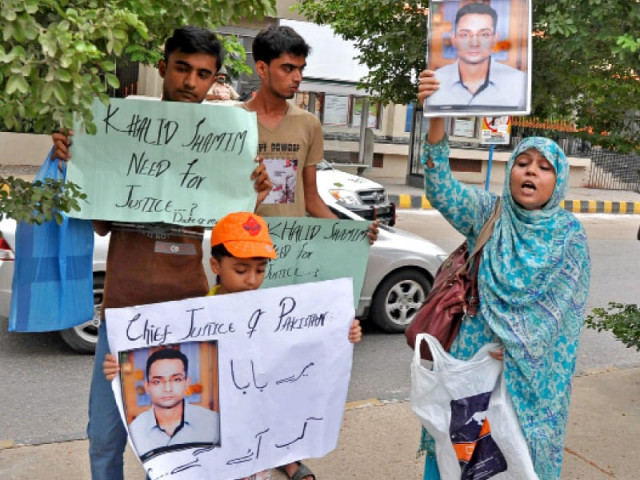SC Law and order hearing: Militant wings of parties behind violence, says Rangers DG
CJP was visibly irritated at the law enforcers for failing to control crime.

Families of missing persons held placards on the route of Chief Justice Iftikhar Chaudhry as his entourage made its way towards the Supreme Court Karachi registry. PHOTO: EXPRESS
If Karachi is ever to become peaceful again, militant wings of political parties need to be abolished, said the Rangers director-general.
Major General Rizwan Akhtar made this statement at the suo motu hearing of the Karachi law and order case at the Supreme Court Karachi registry on Wednesday. Insisting that crime rate in the city had decreased after several search and arrest operations by the paramilitary force, Akhtar blamed the lack of powers for them on the rising death toll.
Responding to his excuses, Chief Justice Iftikhar Chaudhry said the director-general himself was responsible for abolishing these militant wings.
After Wednesday’s hearing, the Supreme Court directed the provincial chief secretary, Sindh IGP and Rangers director-general to submit their reports on the progress made during the last two years in maintaining law and order in the city. The bench will examine these reports today (Thursday) and will pass orders.
At the outset of Wednesday’s proceedings, the chief justice asked the advocate general, Khalid Jawed Khan, to read out the judgment the bench had passed in September 2011. CJ Chaudhry observed that nothing had changed even after two years.
Even though there are police, Rangers and even Frontier Constabulary men deployed, the situation in the city continues to worsen, he observed, adding that people are still being killed and extortionists are now bombing traders’ houses. The kidnappers are receiving ransom through bank transactions and the land mafia has also become more active, he pointed out.
AG Khan admitted that the current situation was not ideal but, he insisted, the law enforcers are making efforts to restore peace. At this, Justice Gulzar Ahmed remarked that the police themselves were not safe. “A citizen cannot walk on the streets and they’re forced to either hire a guard or keep arms,” he said.
Justice Jawwad S. Khawaja mentioned the only difference between the statistics of killings filed by the chief secretary, the police chief and the Rangers chief was that the current figures had outnumbered the previous ones. Visibly irritated, CJ Chaudhry told the authorities that the judges were not here to waste time but to ensure enforcement of fundamental rights under Article 9 of the Constitution.
Justice Khawaja asked Sindh IG Shahid Nadeem Baloch why they have failed to control extortion despite the fact that people on both ends - the extortionist and the victims - are well identifiable to them. Baloch replied that they have held meetings with traders to fix this.
Two years after the apex court had passed its order, it was expected that the law enforcing agencies would have gained full control of the city but the situation is otherwise, the chief justice noted. “Can you say there is 100 per cent calm and peace?” he asked, insisting the Rangers DG accompany him to Lyari in that case.
On problems of prosecution, CJ Chaudhry said the number of the anti-terrorism courts in Sindh have been increased to 25 of which 18 were functioning in Karachi. “If the heads of both the forces have failed, then admit it.” Justice Ahmed suggested the police remove the red lights at signals as the city was so unsafe now.
Sindh govt’s actions
Chief secretary Muhammad Ijaz Chaudhry informed the bench that the chief minister had held a number of meetings with an aim to find out a solution to the persistent law and order situation.
The bench asked him to submit copies of the reports prepared by him on behalf of the provincial chief executive sent to the federal government over the issue of Karachi and whether it had made any demands from Islamabad. The chief secretary will submit a reply today.
Published in The Express Tribune, August 29th, 2013.



















COMMENTS
Comments are moderated and generally will be posted if they are on-topic and not abusive.
For more information, please see our Comments FAQ